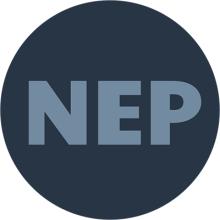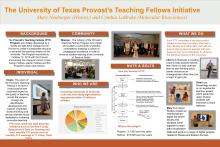PTF Impacts
Provost's Teaching Fellows have made lasting impacts in their departments, colleges and schools, all of the University of Texas, and even the broader scholarship of teaching and learning. Through both individual initiatives and university-wide programs, PTFs continue to serve as catalysts for positive change and further our campus culture of teaching and learning.
Displaying 1 - 8 of 8
ClioVis: Visualizing Connections (Review, Journal of American History)
Dr. Jason Heppler of George Mason University reviewed ClioVis, the digital timeline visualization tool developed by Erika Bsumek, in the March 2024 issue of the Journal of American History. According to an excerpt from the review:
Bearing and Sharing the Burdens of Mentoring in the COVID-19 Pandemic (TAPA)
This invited paper is part of a group of six articles on "rupture and repair" in the wake of the COVID-19 pandemic published in Transactions of the American Philological Association, the journal of the professional organization for American Classicists.

Digital Projects Enrich Undergraduate Research: ClioVis and Epoch (History Department News)
ClioVis, the digital timeline visualization tool created by Erika Bsumek as part of her PTF Initiative, was highlighted in UT Department of History News on May 25, 2020 by Dr. Megan Raby. The article explored the ways that ClioVis and Epoch, an initiative by History faculy Adam Clulow, are being used to create undergraduate research opportunities for UT liberal arts and history students.

Editor's Choice Award: ClioVis Description, Origin, and Uses (Digital Humanities Now)
"ClioVis: Description, Origin, and Uses," a September 2020 article from Not Even Past: the digital magazine of the UT Department of History, was awarded Editor's Choice by the online aggregate Digital Humanities Now.

Thinking Critically with ClioVis (Pedagogy Playground)
Dr. Lindsey Passenger Wieck, faculty at St. Mary's University in San Antonio, Texas, reviewed ClioVis for the pedagogy blog Pedagogy Playground: Innovative Teaching in Higher Education in February 2020. The review discusses her experiences with ClioVis during and after a workshop led by Bsumek, and goes on to highlight the features of the tool which she finds most compelling: interactivity, collaboration, ease of use, exportability, and applications outside of coursework.

Interview with Dr Erika Bsumek, the creator of ClioVis (Not Even Past, UT Department of History)
In September 2020 History faculty Adam Clulow interviewed Erika Bsumek for Not Even Past, the digital magazine of the UT Department of History, to discuss the development, use, and impacts of ClioVis, the digital timeline visualization tool created as part of Bsumek's PTF Initiative. This article is part of a wider series that explored how teachers and students across the History department, the university and world more generally responded in new ways to the unprecedented classroom environment faced in a time of global pandemic.

UT Provost's Teaching Fellows Initiative (Reinvention Collaborative, UERU)
PTF Leaders Cynthia LaBrake and Mary Neuburger presented both a poster and a talk at the 2018 Reinvention Collaborative meeting (now the Association of Undergraduate Education at Research Universities, UERU) on November 8-10, 2018 in Arlington, Virginia. The 2018 Biennial National Conference featured more Undergraduate Vice Presidents/Provosts and more participants overall than any previous Reinvention Collaborative meeting.

ClioVis Digital Timelines: Visualizing Connections
Erika Bsumek built the ClioVis digital timelines platform for instructors and students to build interactive digital timelines as part of their coursework or scholarly initiatives. The platform has been used by thousands of students across the US, including throughout the UT System, University of Michigan, Stanford, and others, in both humanities and STEM disciplines, as well as for research initiatives.

